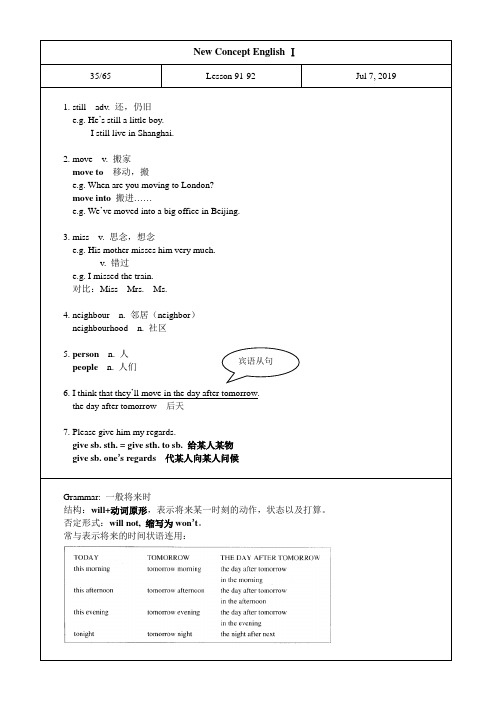新概念英语第一册lesson91-92分析
- 格式:ppt
- 大小:161.50 KB
- 文档页数:16

新概念英语第1册第91-92课课重点语法第91-92课的内容:一、重要句型或语法1、一般将来时表示将来会发生的动作或状态,形式为will do,如:He will come here tomorrow./ They will be in Shanghai next week.二、课文主要语言点Has Ian sold his house yet? Yes, he has. 1)可简单复习一下现在完成时的内容。
2)注意人名Ian的发音He sold it last week. 1)可提问学生为什么此处动词要用一般过去时。
2)注意sell的过去式和过去分词都是sold。
Has he moved to his new house yet? No, not yet. 1)注意对比本句中的move to(搬到)和下文中的move into(搬进,要接宾语)和move in(搬进,不接宾语)的区别。
2)not yet,还没有。
He's still here. He's going to move tomorrow. 可复习be going to do的用法,同时对比与will do的区别:be going to do侧重表达主观打算或意愿。
When? Tomorrow morning? No. Tomorrow afternoon. 两个问句都采用了简略形式,因为口语中往往无需重复上文已经明确的信息,回答也采用简略形式。
完成问句应该是:When is he going to move? Is he going to move tomorrow morning?I'll miss him. 注意提醒will do的缩略形式:'ll do。
He has always been a good neighbour. 本句话可以作为常用句型识记运用:sb. has always been a good ...。

2016新概念第⼀册-Lesson-91-92-课堂及课后练习新概念⼀Lesson91~L92 课内语法新课内容:⼀、单词:拼读、过关、讲解1.still ad.①还,仍旧:He's still here.他仍在这⾥。
(▲still表⽰仍在继续或仍未发⽣,位于所表⽰的情况之前,因此也可在助动词和否定词之前)②([同]even)[修饰⽐较级]还要,更③尽管如此,可还是:It's rainning,(but)still I'd like to go.天在下⾬,可我还是想去。
2.move vt.①移动,搬动,使改变位置(或姿势):move house 搬家vi.①移动;离开;动⾝;前进;(下棋)⾛⼀⼦:Don't move, or I'll shoot.不许动,否则就开枪了②迁移;搬家move to…搬到…eg: Has he moved to his new house yet 他已经搬进新居了吗?3.miss vt.①未找到;未遇到;未看到:miss one's way 迷路②想念;怀念;惦记:I'll miss him.我会想念他的。
③发觉……丢失:I missed my wallet.我发觉⽪夹⼦丢了。
4.neighbour 邻居eg: He has always been a good neighbour.他⼀直是个好邻居。
5.person n.⼈;⼈物eg: He's a very nice person.他是个⾮常好的⼈。
people的单复数The Chinese people are hardworking and brave.▲泛指“⼈民”,“⼈们”时,是单数形式,复数概念;作主语时,与复数动词连⽤。
▲指“民族”、“(⼀个国家的)⼈民”时,可以有单数和复数形式两种6.poor①穷的、贫困的:a poor nation 穷国②虚弱的;不⾜的;笨拙的;③可怜的,不幸的:Poor Ian! 可怜的伊恩!⼆、词组1、错过做某事miss doing sth2、上周last week3、打算做某事be going to do4、搬进---move into5、后天the day after tomorrow6、请代我向他问好please give him my regards7、tomorrow morning 明天早上8、But his wife did. 但他的妻⼦要离开。


新概念英语第1册第91-92课课重点语法第91-92课的内容:一、重要句型或语法1、一般将来时表示将来会发生的动作或状态,形式为will do,如:He will come here tomorrow./ They will be in Shanghai next week.二、课文主要语言点Has Ian sold his house yet? Yes, he has. 1)可简单复习一下现在完成时的内容。
2)注意人名Ian的发音He sold it last week. 1)可提问学生为什么此处动词要用一般过去时。
2)注意sell的过去式和过去分词都是sold。
Has he moved to his new house yet? No, not yet. 1)注意对比本句中的move to(搬到)和下文中的move into(搬进,要接宾语)和move in(搬进,不接宾语)的区别。
2)not yet,还没有。
He's still here. He's going to move tomorrow. 可复习be going to do的用法,同时对比与will do的区别:be going to do侧重表达主观打算或意愿。
When? Tomorrow morning? No. Tomorrow afternoon. 两个问句都采用了简略形式,因为口语中往往无需重复上文已经明确的信息,回答也采用简略形式。
完成问句应该是:When is he going to move? Is he going to move tomorrow morning?I'll miss him. 注意提醒will do的缩略形式:'ll do。
He has always been a good neighbour. 本句话能够作为常用句型识记使用:sb. has always been a good ...。

Lesson 91-92Poor Ian!CATHERING: Has Ian sold his house yet?JENNY: Yes, he has. He sold it last week.CATHERING: Has he moved to his new house yet?JENNY: No, not yet. He's still here. He's going to movetomorrow.CATHERING: When? Tomorrow morning?JENNY: No. Tomorrow afternoon. I'll miss him.He has always been a good neighbour.LIDA: He's a very nice person. We'll all miss him. CATHERING: When will the new people move into thishouse?JENNY: I think that they'll move in the day aftertomorrow.LINDA: Will you see Ian today, Jenny?JENNY: Yes, I will.LINDA: Please give him my regards.CATHERING: Poor Ian! He didn't want to leave this house.JENNY: No, he didn't want to leave, but his wife did!1. Has Ian sold his house yet?Has he moved to his new house yet?--yet 己经,还(疑问句,否定句)--already (肯定句)--My father has already come home form work.(already置于助动词与实义动词之间)--Has your father come home yet?(yet一般放在句末)--My father hasn't come home from work yet.2. He sold it last week.一般过去时,强调“上周”这个时间所发生“卖房”的这个动作。

Lesson 91--92 Poor Ian 可怜的伊恩回答:1.Has Ian sold his house ? 2. When will the new people move into the house ? 3. Who wanted to sell the house ?一、Key words1. still ;2. move ;搬家,移动;搬迁,迁入新居;搬出,迁出3. miss ;未能4. neighbour ;四邻,邻近地区;在…附近=5. person ;亲自;个人的,私人的;6. people7. poor ;反义词;不擅长…/二、Key structuresHas Ian sold his house yet ?I think that they’ll move in the day after tomorrow .Will you see Ian today, Jenny ? Please give him my regards . No, he didn’t want to leave, but his wife did .三、Text1. Has Ian sold his house yet ?译文:【讲解】现在完成时的一般疑问句,将has或者have提到句首。
yet“已经”用于疑问句中,肯定句中用。
2. He has always been a good neighbour. 译文:【讲解】现在完成时的陈述句,强调的是自从我们做邻居以来,他一直很好。
3.He’s a very nice person. 文:【讲解】一般现在时,是对这个人的总体评价。
person是指人,当需要表示复数形式时,往往用people。
4. I think that they’ll move in the day after tomorrow . 译文:【讲解】I think我认为,我想。
后面接宾语从句:They’ll move in the day after tomorrow .5. Will you see Ian today, Jenny ? 译文:【讲解】由will引导的一般将来时的一般疑问句。
新概念英语课堂笔记第一册Lesson 91-92Word Studystill【用法】adv. 还,仍旧;还要,甚至更;静止地adj. 静止的,不动的;寂静的【例句】I still don’t understand what he meant. 我还是不明白他是什么意思。
She was still beautiful at the age of 46. 她46岁时依然美丽。
It was hot yesterday, but it’s still hotter today. 昨天很热,然而今天甚至还要热些。
She looked very ill last week and this week looks still worse. 上星期她看上去病的很厉害,而这个星期看来更不行了。
He is sitting still. 他一动不动地坐着。
The patient is lying still. 病人安静地躺着。
The doctor asked me to keep still. 医生叫我不要动。
How still everything is! 一切是多么寂静啊!The night was very still. 那天晚上很宁静。
move【用法】v. 搬家;搬动,移动;使感动【词组】move to 搬到……move sth. away 搬开;移走move on 朝前走;继续移动move about 走来走去move in 迁入move out 迁出【扩展】movement n. 移动;搬动;运动;活动movable adj. 可移动的moved adj. 感动的moving adj. 令人感动的,感人的【例句】The Smiths are going to move to New York. 史密斯一家打算搬到纽约去。
They moved into the new house last month. 他们上个月搬进了新家。
Lesson 91 Poor Ian! & Lesson 92 When will …?一、教学重点1、时态:一般将来时态。
2、句型:-What will you do tomorrow? -I’ll do... tomorrow.-When will you do...? -I’ll do it tomorrow.-Will you do...tomorrow? -Yes, I will. / No, I won’t.二单词详解★still adv. 还,仍旧①adv. 还是,仍然I still don’t understand what’s wrong with him.②adj&adv. 静止;安静keep still保持静止He is sitting still. 他一动不动地坐着。
★move感动: The story moves me.搬家: move to 搬到…地方move in 搬进move out 搬出来move away 搬走★miss v. 想念,思念① v. 想念,惦念I miss you very much.② v. 错过;未做到He overslept and missed his train.★neighbour 邻居Your neighbour is someone who lives near you★person n. 人(强调个体,不分男女老少,有复数persons)He is a nice/good person. 他是个好人。
in person 亲自,直接的He will go to get the money in person. 他将亲自去取钱。
personal adj. 个人的,私人的 a personal letter★people n. 人们(强调集体,是集合名词)ten people 十个人(集体名词,不加S,用复数)Chinese people 中华儿女Let's drink to the friendship of our two peoples. (指两国人民/民族,用复数形式)★ poor adj.①可怜的Poor boy!②贫穷的the poor -- the rich③笨拙的,差劲的be good/poor at sth. 擅长/不擅长三、精讲课文★ -Has he moved to his new house yet?(疑问句尾)move to 搬到…-No, not yet. = No, he has not moved to his new house yet.(否定句尾)★He’s still here. = He is still here. 副词still也可用于一般现在时,注意位置在be 动词之后。